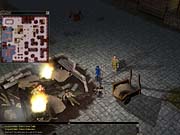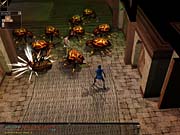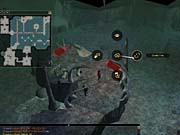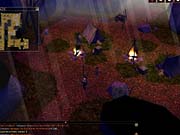You might think that a game like Neverwinter Nights probably isn't very healthy for the gaming industry. After all, this is the sort of game you could easily play for months or even longer. Simply put, once you get into Neverwinter Nights, you'll likely have no need or desire to play another role-playing game for a long time--or any other game for that matter. And while that's unfortunate for any game trying to compete, it's certainly a good thing as far as most gamers should be concerned. They'll find that Neverwinter Nights is indeed the end-all, be-all Dungeons & Dragons RPG that it's been touted to be for the last several years.

They might also be surprised to find that Neverwinter Nights is actually very accessible, much more so than most RPGs, making it equally recommendable to new players and to hard-core role-playing fans. Yet the latter group especially will appreciate Neverwinter Nights, since it includes not just an excellent stand-alone RPG, but also BioWare's powerful Aurora toolset, which effectively lets aspiring dungeon masters create their very own adventures. They can then get their friends together to play these modules and manipulate them--DM them--in real time. So here it is at last: the pen-and-paper D&D experience on your PC. In short, Neverwinter Nights was definitely worth the wait. But it's not necessarily what you might have expected, particularly in its campaign and multiplayer features.
To set the record straight, Neverwinter Nights basically contains four different elements: the campaign, the toolset, the DM client, and the multiplayer mode. The first of these is the brunt of the game, and it's by all means a lengthy, highly entertaining D&D campaign. It's comparable with and in many ways superior to BioWare's previous RPGs--or any other top-notch RPG to date for that matter. If Neverwinter Nights offered nothing other than this campaign, it would still be one of the best RPGs to come out in years. If you're looking to buy Neverwinter Nights for a traditional role-playing experience, then this highly replayable 60-to-80-hour campaign, with its great story and countless optional side quests, won't disappoint you, despite having a few minor problems.
But then there's also the Aurora toolset, a separate utility for creating your own campaign modules. This is an impressive program that's reasonably user-friendly, considering how much it lets you do. In the Aurora toolset, you basically get the license to use the Neverwinter Nights game engine to make just about any type of fantasy adventure you can imagine. Some technical aptitude is required, and some programming knowledge will help if you wish to script your own events, making the toolset's learning curve not at all comparable with the learning curve of a typical game. Coming to grips with the toolset is rather more like trying to learn programs like Adobe Photoshop or Illustrator. That is, you can figure a lot of it out on your own, you can learn a lot of it through instruction, and what you can do with it is limited only mostly by your own skill and talent. The game doesn't ship with a complete set of documentation for the toolset, but because of the community appeal of Neverwinter Nights, the answers to any questions you might have about it are just waiting to be read on the game's official message boards.

In addition to the campaign and the toolset, Neverwinter Nights includes a DM client, which lets you play the game using the godlike powers of a pen-and-paper D&D dungeon master, able to manipulate the proceedings of any module in real time and at your whim. You can take control over any character, you can give players items and experience, and do much more. Like the Aurora toolset, this isn't easy--especially because you're something of a performance artist in your role as DM, and your audience's enjoyment depends largely on your actions. But the DM client has an efficient interface and is one of the key differences that can separate a Neverwinter Nights module from a player-generated map for some other game. After all, though you can use the toolset to create a fun-filled stand-alone dungeon hack of some sort, in conjunction with the DM client, you can truly create a unique role-playing experience for someone--and for yourself. If you've ever played a pen-and-paper RPG, especially as the DM, then you probably have an idea of the Neverwinter Nights DM client's potential.
Regardless of whether or not you wish to be DM, the multiplayer option of Neverwinter Nights basically lets you host your own module over the Internet or join in on someone else's game. Neverwinter Nights doesn't ship with a built-in multiplayer content, but the campaign can be played through by groups of players that can cooperate or try to foil one another along the way. Beyond that, the game's multiplayer mode is completely community-driven. Essentially, in making Neverwinter Nights, BioWare created a powerful toolset and then used it to build a superb role-playing game that should be inspiring for any would-be module maker, and now, it has opened the floodgates for user-created content.
It's really just a matter of time before great things emerge from Neverwinter Nights' already huge player community. So even if you want nothing to do with the Aurora toolset or the DM client, at the very least, you'll still have access to the fruits of other people's labors. The game has been available for less than a week, and already a number of original modules are being hosted in the game's multiplayer lobby. File sizes are small, which means download times are minuscule, though we've consistently encountered lag issues when actually playing with others online. A lot of this depends on the host computer as well as on one's own Internet connection, but at any rate, we were never able to experience online gameplay as smooth as the single-player mode. It also bears mention that, for various reasons, multiplayer Neverwinter Nights is much better suited to being played with friends than with strangers. It's D&D, after all, and just as it wouldn't make much sense to invite a bunch of strangers over for a pen-and-paper D&D session, having a bunch of strangers in an online game of Neverwinter Nights also doesn't really work. But if you manage to get together and play with some friends, you'll likely have a very good time. You'll appreciate that the game has lots of role-playing provisions built into it, including all the sorts of "emote" animations (laughing, pointing, cheering, and so on) that you'd sooner find in an online-only game like EverQuest.

Neverwinter Nights isn't the first Dungeons & Dragons game for the computer to make use of the pen-and-paper game's 3rd Edition rules, but it's the first to implement them so well. The standard gameplay of Neverwinter Nights is roughly comparable with BioWare's previous role-playing games in the Baldur's Gate series in that the game runs in real time and is viewed from an isometric perspective. However, with Neverwinter Nights, BioWare has finally put to rest its long-lasting Infinity engine seen in those games, opting instead for a fully 3D engine that lets you zoom and rotate your view to your liking. It also allows for some detailed, well-animated characters and good-looking environments. The transition from Baldur's Gate-style 2D graphics to 3D graphics is mostly cosmetic, but the changes from 2nd Edition to 3rd Edition D&D have a significant impact on gameplay. Probably the best thing about 3rd Edition D&D is how much freedom it gives you in creating your character. In previous editions of D&D, if you wanted to be a paladin, you needed to play as a human character and roll up some extremely high stats--otherwise, that character class was unavailable. Now there are no inherent limitations on anything, and any race can be any class. Want to be a half-orc sorceress or a gnome monk? How about an elf barbarian? It's all possible, and playing the campaign of Neverwinter Nights will be quite different depending on which sort of character you create.
Interestingly, unlike in most role-playing systems in which character classes become more specialized as they gain experience levels, under 3rd Edition rules, high-level characters can start to seem pretty similar. That's because character classes in 3rd Edition determine the sorts of special abilities that your character will start with, but most any character can gain these abilities later on. For example, a fighter starts with the ability to wear heavy armor and use shields. A wizard doesn't but eventually could. Yes, you can eventually have a wizard decked out in full plate armor and carrying a sword and shield. The heavy armor will negatively impact his or her spellcasting ability, but the choice is yours. You're also not stuck with the character class you initially select and can opt to gain a level in most any other character class whenever you've gained enough experience. Some penalties may apply, but if you want to make a dwarven druid bard or a half-elven ranger cleric, you can.

There are seemingly countless options available, and Dungeons & Dragons is certainly a complex system-- nevertheless, the game does a fantastic job of getting you started. A bunch of pregenerated characters are available from the get-go; or if you opt to make your own, you can click on a "recommended" button that will suggest what you should do next, every step of the way. This gives good advice on how you should apply your ability scores depending on your class, which starting spells and special feats your character should take, and so on. The campaign's prelude starts you off in an adventurers' academy where, in context, you'll learn how to control the game and learn about your character's primary skills, depending on which character class you chose. You can skip most of this tutorial if you don't want to deal with it, but it's a great way for new players to get into the game.
During play, you'll find that Neverwinter Nights' interface and controls are outstanding. Characters move nice and fast, so there's never any tedious travel. You can click to tell your character where to go, press and hold the left mouse button to keep running in the direction of the cursor, or use the W, A, S, and D keys to move. Right-clicking calls up a radial menu that lets you interact with any character or object in various ways. This lets you easily perform tasks like unlocking chests and disarming traps or picking characters' pockets and using combat feats. Also, a dozen customizable macro buttons line the bottom of the screen, allowing you to set up convenient one-click (or one-key) access to different weapons, spells, items, potions, and special abilities. If a dozen isn't enough for you, a total of three dozen are available by using the Shift or Ctrl keys. An optional onscreen automap clearly displays your relative location in each region and denotes any points of interest. A journal feature also helps keep things organized by clearly sorting all the quests you've taken on and indicating whether you've made any progress in them or finished them altogether. The game's manual, which is more than 200 pages long, gives plenty of background info on the 3rd Edition rules, but the game itself is well designed enough that the manual isn't required reading.

Besides the prelude, the campaign spans four big chapters, the first three of which are especially large. Each of these first three chapters is like a stand-alone game in itself, with a beginning, middle, and end. But of course, the chapters themselves interrelate, making for a truly epic experience at the end of it all. Still, Neverwinter Nights doesn't always seem quite as epic as Baldur's Gate II before it, mostly because you control just your one character--by comparison, in Baldur's Gate II, you commanded up to six adventurers. Fortunately, you do get to take on a henchman here. There are a number of nonplayer characters whom you can recruit to fight at your side to the bitter end, and between your skills and theirs, you should be able to get through just about any situation. All these prospective associates are interesting characters with their own agendas and their own quests, so there's some replay value to be found in deciding on which one to choose as your traveling companion--or whether to choose one at all.
The henchmen are computer-controlled and will follow you around and defend you automatically and effectively. Sometimes the artificial intelligence makes your associates act a little too zealously, but you can give them some simple orders to keep them in line. Unfortunately, you can't access their inventories to give them better equipment or have them carry things for you, and if you give them potions, they'll always drink them right away. In the end, though, being limited to just one henchman is a decent trade-off. Because you'll have only a couple of characters to keep track of (more if you have a familiar or summoned creature at your side), combat in Neverwinter Nights is a lot easier to manage than in Baldur's Gate II. You'll rarely have to pause the action, and through not having direct control of your henchman, sometimes you'll truly get the sense that you're working with a partner rather than working as a coach.

Starting out as a lowly first-level adventurer, you'll really grow in power over the course of the game and get somewhere in the vicinity of 20th level by the conclusion, which is the upper limit for player characters in Neverwinter Nights. Actually, one of the biggest issues with the campaign is, depending on what sort of character you play and how many side quests you opt to do, you may find that you're already very powerful by the end of the game's first chapter. Part of this seems inherent to 3rd Edition D&D, in which characters gain levels faster and grow more powerful with each level than in previous versions of the game system. But part of this also seems to be a problem with the balance of the campaign, which for the most part gets easier rather than more challenging as you proceed. It can be satisfying to mow through hordes of orcs or undead, but you might feel a bit disappointed after trouncing some supposedly much tougher foes, whom you'd expect to put up a better fight.
Another reason why Neverwinter Nights' campaign is pretty easy, at least compared with its predecessor, is that at the beginning of the campaign, you receive an item that lets you instantly teleport back to your home base. There, you can heal up, buy and sell equipment, and just take a breather. Then, for a small fee, you can teleport right back to where you were, even if you were in the middle of fighting a dragon or two. If your henchman ever dies, you can teleport back, and he or she will always be resurrected and waiting for you. Plus, even if you yourself die, you can "respawn" back at base in exchange for some gold and experience. Respawning and teleporting around a lot should be familiar experiences if you've played Blizzard's action-packed Diablo II, but you might not expect this from a more-traditional RPG like Neverwinter Nights. Still, the influence of Diablo II on the game is for the best, because it lets you concentrate on questing and adventuring rather than on backtracking and reloading saved games.
While it was busy drawing influence from other games, Neverwinter Nights could have taken a lesson from the recent Dungeon Siege, which let you instantly organize your inventory at the touch of a button. Soon into the campaign of Neverwinter Nights, you'll have more potions, scrolls, gems, rings, and other doodads than you'll know what to do with. Finding lots of cool items is part of the appeal of RPGs, but in Neverwinter Nights, you'll end up carrying around too much junk for anyone's good. The campaign has a few other annoying bits--for instance, treasure chests are everywhere! Early on, the extra gold pieces and potions you find in these will be helpful. Later, you'll be compelled to open them in the off chance that they contain more than just another silver necklace or something, but 95 percent of the time, you'll be out of luck. Traps are almost as common as chests, and they appear even in places where they don't seem to belong. You'll also come across a lot of things that are locked, but fortunately, characters who can't pick the locks can at least bash open or blast open whatever the lock is affixed to. Furthermore, a couple of old D&D standbys--pits and secret doors--are nowhere to be found in Neverwinter Nights. The game engine can do mock-secret doors using scripted sequences, but you can't detect them like you could in Baldur's Gate II.

You might also be somewhat annoyed to find that corpses of killed foes soon vanish, an aspect of the new 3D engine that's certainly a step back from the old Infinity engine, in which bodies piled high. In games such as Icewind Dale and Baldur's Gate II, part of the fun of some of the big battles was seeing all the carnage once the dust settled--you can't do that here. Another small issue with the campaign, or with any Neverwinter Nights module, is in the way that the automap works. Not that it's ineffective, though--actually, it's quite the opposite. It will fill in areas that are well beyond your character's line of sight, so annotations will suddenly appear for areas that you haven't even seen yet. Certainly a lot of the suspense is relieved far in advance when you know that the orc warlord's throne room is just around the corner. The game also has a few technical issues. Within a day of release, a patch was issued to address the game's multiplayer stability. But it doesn't solve some of the scripting problems and quest bugs that sometimes crop up in the campaign. Most of these aren't a big deal, though.
With that aside, Neverwinter Nights is tremendous fun to play. The quests are well designed, entertaining, and interesting, and there are tons of them and tons of different battles in between them. Combat is very enjoyable too, because full-on fighter types, stealthy rogue types, and magic-using types are equally viable and have plenty of options. The action is very dynamic, more so than in most any RPG to date. You'll actually see a character dodge out of the way when his foe swings and misses. Spell effects are uniformly impressive, and popular D&D favorites such as fireball and cone of cold have never looked better. Over the long course of the game, you'll meet a lot of great characters, find a lot of powerful weapons, spells, and artifacts, solve a lot of intriguing quests, and visit a lot of interesting places. You'll even get to commission some custom weapons and armor, as well as create your own magic items using alchemical formulas. Best of all, the campaign is open-ended, allowing you to play it through as you see fit. Evil or roguish characters can try to demand or finagle more money for their efforts or can kill indiscriminately. Good characters can opt to act selflessly and to solve matters without resorting to violence. Stupid characters can stumble their way through conversations. The campaign really lets you get into the spirit of D&D and solve quests in different ways and in different orders.

Neverwinter Nights has been in development for years, and it shows. The graphics engine is solid, but it isn't drop-dead gorgeous, like it would have been by the standards of a year or two ago. Many of the enemies you'll face look great, especially some of the larger ones. However, some of the character models look blocky, though the smooth animations and good-looking shadows make up for this. Likewise, some of the game's environments don't look as good as others, particularly the caverns and catacombs, which are rather generic. There aren't that many types of environments overall, but the game's cities and especially its dense forests, where rays of sunlight cut through the canopy above, look excellent. In general, the 3D engine runs smoothly on midrange machines with fast graphics cards, though slower machines with less RAM and older graphics cards will experience some frame rate issues. Also, the game's loading times are generally short. Neverwinter Nights sounds great, and it features a fitting, diverse orchestral score from Jeremy Soule, who seems to have a monopoly over RPG soundtracks these days, with this year's Morrowind and Dungeon Siege also under his belt. The music picks up right as the action does and sometimes fades out at suspenseful moments. The rest of the audio is also well done. Some great ambient effects make the settings seem very lively, though some of the effects are repeated a bit too often. There's some sporadic voice-over in the campaign, mostly reserved for the major characters, and it's good--though at times a little forced.
All told, Neverwinter Nights is one of those exceedingly rare games that has a lot to offer virtually everyone, even if they aren't already into RPGs. The campaign alone is easily worth the price of admission. Not only is it on par with all the best computer RPGs to date, but it's also a lot friendlier to new players, making Neverwinter Nights a perfectly good choice as someone's first role-playing game. Add the other aspects of Neverwinter Nights--the toolset, the DM client, and the multiplayer options--and you have a unique game that's an undeniably remarkable achievement. Some games are memorable, but years from now, people won't just remember Neverwinter Nights--they'll also still be playing.